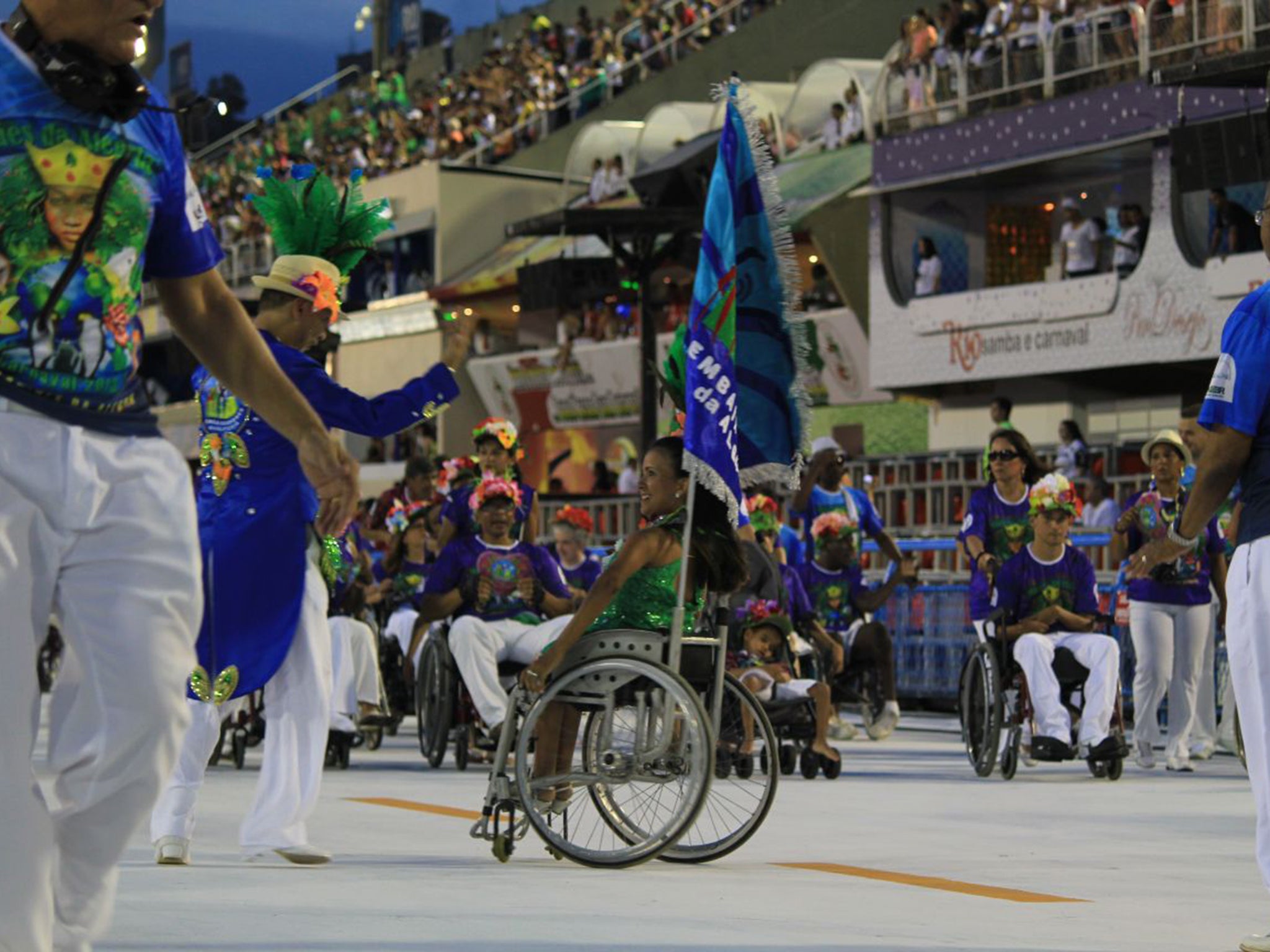Rio de Janeiro carnival 2015: 'Happy Ambassadors' - performers with disabilities are bringing variety to the Brazilian party
'There are always people who stare at me but when I samba everything changes,' says Viviane de Assis

Your support helps us to tell the story
From reproductive rights to climate change to Big Tech, The Independent is on the ground when the story is developing. Whether it's investigating the financials of Elon Musk's pro-Trump PAC or producing our latest documentary, 'The A Word', which shines a light on the American women fighting for reproductive rights, we know how important it is to parse out the facts from the messaging.
At such a critical moment in US history, we need reporters on the ground. Your donation allows us to keep sending journalists to speak to both sides of the story.
The Independent is trusted by Americans across the entire political spectrum. And unlike many other quality news outlets, we choose not to lock Americans out of our reporting and analysis with paywalls. We believe quality journalism should be available to everyone, paid for by those who can afford it.
Your support makes all the difference.With a star dancer who is just 4ft tall and performers who include wheelchair users and amputees, Embaixadores da Alegria (“Happy Ambassadors”) is bringing variety to the preened beauty of Brazil’s samba queens at this week’s carnival celebrations.
Founded by British expat Paul Davies, Embaixadores da Alegria is the first samba school devoted entirely to people with any kind of mental or physical disability. For the past eight years, the samba school has taken part in Rio’s annual carnival celebrations, breaking down some of the barriers of exclusion for people with disabilities in Brazil.
“People don’t associate people with disabilities with samba,” said Mr Davies, a carnival designer originally from Romsey, Hampshire, who moved to Brazil more than 20 years ago. Even among the vibrancy of the carnival’s parades, certain aesthetic standards prevail, he says.
“Rio especially has a certain type of beauty so it has to be the ‘Globo’ style,” he said, referring to Brazil’s main broadcaster. “If you’re not in that particular pattern, you’re automatically rejected.”
Mr Davies, who has been involved in carnival since he arrived in Brazil and has directed for one of the top schools, Viradouro, started the project in 2006 when a slipped disc prevented him from taking part himself.
“I love carnival,” he said. “I thought, ‘What must it be like for someone who can’t parade because of a disability?’”
According to the last census, there are more than 45 million people in Brazil with some kind of disability, making up almost a quarter of the population.
The school brings together more than 70 different disability organisations in Rio and includes cancer patients, people with Down’s syndrome and those with psychiatric disorders.This year, 1,600 “ambassadors” will perform at Rio’s purpose-built carnival arena, the Sambadrome, at the Champions’ Parade on Saturday.
Brazilians with disabilities regularly suffer prejudice and social exclusion. Mr Davies described seeing a wheelchair user passed by two bus drivers, who refused to stop and help them on. Elevators as well as chair lifts in metro stations are often broken, and trying to cross main roads is “death-defying”, Mr Davies said.
With the 2016 Paralympic Games taking place in Rio de Janeiro next year, Mr Davies wants to give disabled people greater recognition and visibility in Brazil.
”Our biggest challenge was getting people to believe in what we were doing,” he said of the samba school. “The feeling was, ‘how can that be beautiful?’
“It took me two years to convince the dwarfism association that I wouldn’t use them as clowns.”
The school is currently lacking sponsorship or a base, meaning they have been unable to rehearse before performing at the Sambadrome.
“It’s really a miracle because we don’t have any rehearsals,” Mr Davies said. “But in eight years, we have never had any problems.”
One of the most experienced performers is Viviane de Assis, 35, who has dwarfism and has danced samba in other groups since she was a child.
“It’s beautiful,” the mother-of-one, known as Vivi, said. “Embaixadores gives an opportunity to everyone. There are always people who look and stare and shout about my size but when I samba, everything changes.”
Join our commenting forum
Join thought-provoking conversations, follow other Independent readers and see their replies
Comments